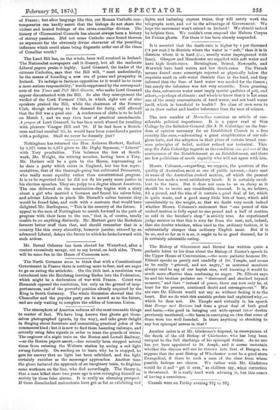The Bishop of Gloucester and Bristol has written quite a
pathetic letter to his dean about the Bishop of Exeter's speech in the Upper House of Convocation,—the more pathetic because Dr. Ellicott speaks so gently and candidly of Dr. Temple, and seems to be really " grieved, and not angry," as maternal monitors always used to say of our boyish sins, well knowing it would be much more effective than confessing to anger. Dr. Ellicott says he and his brother prelates are " distressed and shocked beyond measure," and that " instead of peace, there can now only be, at least for the present, continued doubt and estrangement." We are sure Dr. Ellicott would not say so without feeling it to the heart. But we do wish this amiable prelate had explained why,— which he does not. Dr. Temple said virtually in his speech that Essays and Reviews had done a great deal of both good and harm,—the good in bringing out wide-spread latent doubts previously smothered,—the harm in conveying an idea that some of them were too well founded. Is there anything so shocking to any but episcopal nerves in that?


































 Previous page
Previous page